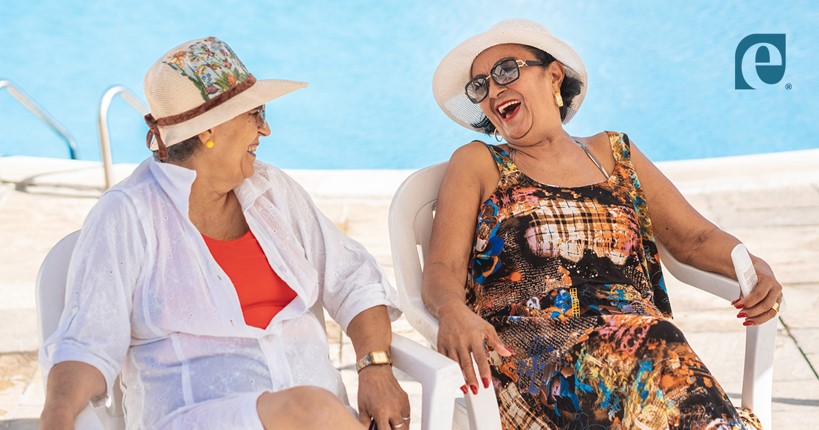For many seniors, the summer months present increased opportunities for outdoor recreation. Those in cooler parts of the country might enjoy warmer summertime temps that allow for enjoyable walks through the park and extended time outdoors. In desert climates, dips in the pool can provide ample amounts of easy exercise and social stimulation to keep older adults healthy – but they can also come with risks.
According to Joyal Simmons, SVP of clinical services and compliance at Encore Communities, “With age comes the decreased ability to sweat and regulate one’s body temperature, putting seniors at a greater risk of dehydration, hyperthermia and heat stroke. The first step to mitigating these conditions is to recognize the signs of heat-related illness.”
If a senior experiences inexplicable headaches, confusion, or dizziness, then this might be a sign that they’re overheating. To prevent heat-related illness from developing into heat stroke, a potentially fatal condition, seniors should get to a cool place, drink water and even take a cold bath or shower. If symptoms persist, medical attention should be sought immediately.
Beyond monitoring symptoms of overheating, seniors should also pay attention to their water intake. Due to both medications and changes in body composition, nearly half of older adults are chronically dehydrated, a condition that can increase one’s chance of falls or heat-related illness. To prevent dehydration, seniors should try to drink 6-8 glasses of water per day or even more if engaging in outdoor activities. Since thirst tends to diminish with age, seniors should also consider adopting an hourly schedule of water consumption.
Seniors should also be mindful of protecting themselves from the sun. One study finds that less than half of older adults utilize any form of sun protection for their skin, a choice that may lead to an increased risk of skin cancer. To protect themselves from the sun, however, seniors should utilize more than just sunscreen. When possible, wide-brimmed hats, long sleeves and long pants should be used to protect skin from the sun’s harmful rays. Although these articles of clothing may seem like they’d increase one’s body temperature, breathable fabrics like cotton and linen can have a cooling effect. When possible, seniors should also try to take refuge in the shade – lessening the body’s exposure to increased temps and UV rays at the same time.
With the summertime comes an abundance of opportunities to create lasting memories amid warmer temperatures – they key is to do it safely.

Dan is Vice President, Marketing of the Alumus family of companies. A Seattle native, he earned his BA in Humanities and Political Science at Evergreen State College. He started his career as a newspaper columnist, eventually transitioning into marketing and tech writing for Microsoft and several other startups. He later launched a successful creative agency focused on branding, digital marketing, and content production in Los Angeles, where he worked for several nursing and behavioral health clients, eventually becoming the National Marketing Director for one of them.
He has taught Vipassana mindfulness meditation and MBSR and spends whatever free time he has with his son snowboarding, hiking, and camping in the mountains.
